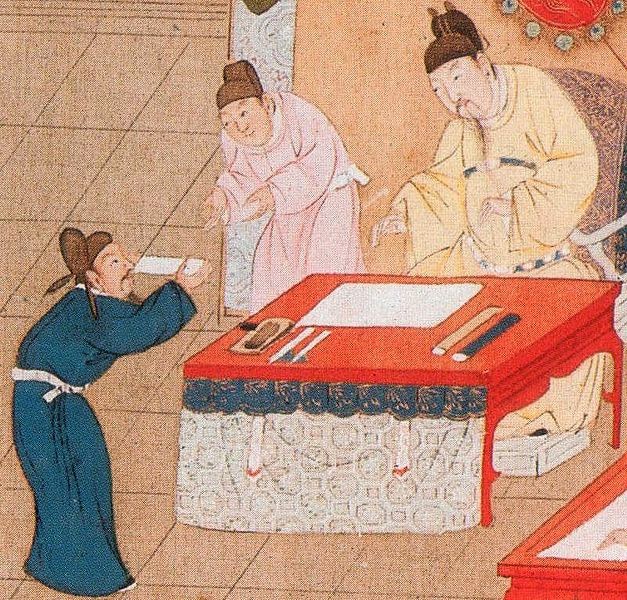I look for a time when test scores meant so much to a society. I fondly remember dynastic China. Here, the tests favored at certain points were very different from the tests fabricated by Pearson.
There was some merit in the Chinese civil-service system which evolved over time. Although not all discrimination and favoritism could be rooted out, the exams helped the gentry and commoners have a shot at helping the emperor rule the empire. For a time when there was no democracy, this was not a bad step in that direction.
These civil-service tests operated at different levels of the government and served as the gateway, allowing a greater variety of qualified persons to achieve status in dynastic China. The tests broached such subjects as Confucian classics, math, law, calligraphy and, for a time, poetry.
The tests changed significantly in format over time. In 115 A.D., test takers were required to master the "Six Arts." I am very happy to say this list included music. It also included math, writing, knowledge of rituals, archery and horsemanship. At a later point, during the Sui Dynasty, the "Five Studies" replaced the "Six Arts." What's in a name? The "Five Studies" actually expanded the curriculum to include government finance, military strategy, farming, geography and the Confucian classics.
In some ways, as one might imagine, these tests, as all tests, indeed, seemed less than ideal. At one point, there was an oral part to the exam, but this seemed to work against some with less than favored dialects. Large parts of the exams relied upon memorization. Test takers needed to rote memorize exact quotes and reproduce them to perfection. Part of the tests included filling in blanks with the words of Confucius.
Security was always a major concern, particularly at the exam's highest level. Palace exams were held every three years. Test candidates had to arrive at the Imperial palace with the barest necessities for survival. They brought a water pitcher, food, bedding, a chamber pot for what might be their only relief during the testing cycle, and writing implements. Test takers were imprisoned in cells for three days, lacking heat, good light and proper sanitation.
There were 7500 testing cells in Guangdong, China, and, I believe, 10,000 in Beijing.
From what I have read although the tests largely relied upon rote memorization, they did not test knowledge, per se. And, they did not even ask about science or business. Instead, they focused on judgment and character.
In some key aspects, the Chinese civil-service exams seem very different from the tests of today. As far as I know, the tests were not manufactured by an imperial version of the profit-hungry Pearson corporation. The teachers of the test takers suffered no negative consequences for the performance of any of their students. The test takers needed to pass the test only once at each level. If they achieved rank, they were trusted as a professionals, not retested or repeatedly harassed by a Department of Education.
For a time, as stated earlier, the tests also required some original composition of poetry. Here, I would point to the beloved tale of Double Happiness. When the young scholar takes ill on his journey toward the exam, he is nursed to health by a herbalist doctor and his lovely daughter. Of course, they fall in love. The young man recovers and dutifully departs for the exam. Before doing so, however, the young woman gives him the right-hand part of a couplet:
"Green trees against the sky in the spring rain while the sky set off the spring trees in the obscuration."
I can think of few better parting gifts. This does not necessarily mean I have a handle on its meaning. That is the great thing about art. It encapsulates emotion which can never satisfy Bill Gates' insatiable quest for metrics as a measurement of life.
Well, as it turns out the emperor tests the young man by asking him to complete his left-hand part of a couplet:
"Red flowers dot the land in the breeze's chase while the land colored up in red after the kiss."
The scholar replied with the antithetical couplet that his darling had left him as a parting gift. And, what do you know, it matched perfectly. The young man was awarded first place in the exam. Go figure! He returned to his sweetheart--who in this case--proved herself "highly effective," albeit not exactly by Danielson's standards. They were married. And, of course, lived happily ever after. The rest (or should I say, "the test") is history.
I wonder what this says about the test takers "judgment and character" when under intense pressure. The more things change, sometimes it is truly amazing how much remains the same.
Given all this knowledge and our president's supposed faith in the value-added measures to determine teacher worthiness, I wonder if we might not enshrine tests as even more sacred in our system.
Given that unlike Dynastic China, we have a greater level of merit-based achievement here, why don't we pick our presidents and, indeed, all important leaders, based primarily upon their test scores? Pearson could manufacture some test with all kinds of questions about talking pineapples and such. Pearson might even dare to necessitate that presidential candidates try their hand at creating original poetry. It is a window into the soul. We could choose the highest test scores and beg those persons to be our next President and Vice-President, our next Secretary of Education, the possibilities are limitless.
I do have one concern, however, when we try to cut costs by hiring people via Craigslist to grade the exams, will we have a margin of error?





No comments:
Post a Comment